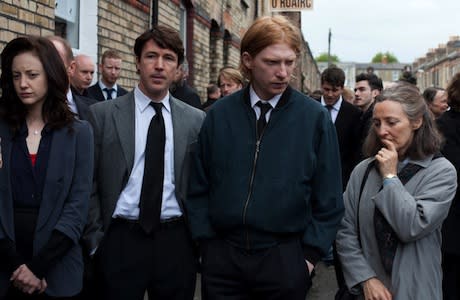After a brief contextualizing preamble set in 1973 Belfast, James Marsh's deliberately distanced and entirely unsentimental spy thriller, Shadow Dancer, jumps forward 20 years. Colette McVeigh (Andrea Riseborough) darts through a subway station, getting on and off the train, dropping a suspicious package in a stairwell, which we later learn is a bomb. Sensing danger, she flees the scene, escaping down a subway tunnel where two MI5 agents apprehend her, setting up a premise of paranoia, duplicity and a conflicted sense of self in relation to political responsibilities, personal allegiances and past signifiers. Since her entire family is defined by their involvement in the IRA, being ideologically shaped by their cause rather than a bigger sense of state and social order, the demand that she become an informant for MI5 agent Mac (Clive Owen) is met with obvious resistance. The inner battle, one that's never verbalized or even particularly clear beneath Marsh's perpetually tense but entirely unembellished direction, is the protection of herself and her son versus her need to remain true to her guiding ideology. Though Mac demonstrates empathy, caring for Colette and fighting to keep her protected even when she doesn't show up for important meetings, she remains removed, demonstrating kindness only when it benefits her, but having a steely, calculated disposition that leaves her motivations and intentions unclear until the inevitable wrenching climax. This sense of detachment and intentional avoidance of standard character readings and reaction — all involved have spent years building up a stoic resolve, one that only cracks slightly and intermittently for those watching closely enough— isn't limited to Colette and her MI5 contact. Even his attempts to understand his superior's (Gillian Anderson) casual indifference towards his mole and his efforts to obtain a backstory on the McVeigh family are met with inexplicable roadblocks. Those around him never give any visual or verbal cues as to what their motivations might be or where their lack of concern might stem from. The resulting dynamic is the of omnipresent dread and unease — there's a sense that there's more to the story than is being let on, but no affirmations or structural guidance to suggest how it might all turn out. Everyone's projected personal morality is relative and ambiguous, which reiterates the steadfast thematic handling of life as a militaristic performance of political beliefs, while exaggerating the constant sense of paranoia implicit in this existence without playing with perspective or abstract stylization. Though frustrating, at times, and never quite fulfilling the promise of its taut, well-crafted early sequences, Shadow Dancer lingers in the mind, inspiring thought about the composition of identity in relation to country and upbringing, without resorting to didactics or preaching. The "Making of" addresses the style partially, focusing more on approaching intimidating characters that never spell out their motivations.
(Mongrel Media)Shadow Dancer
James Marsh

BY Robert BellPublished Oct 10, 2013